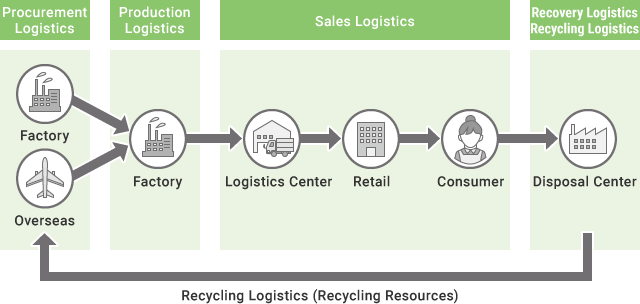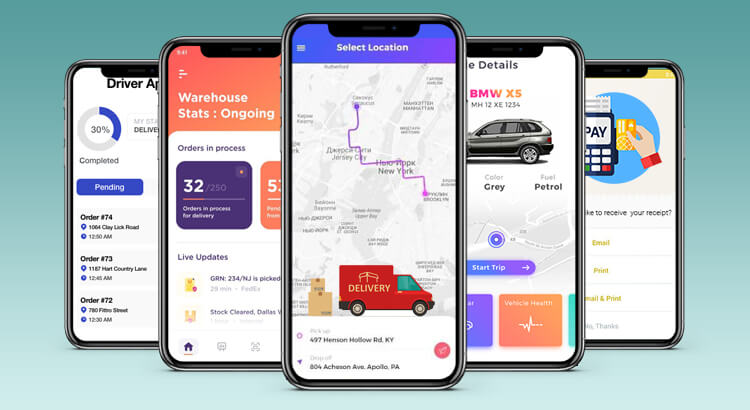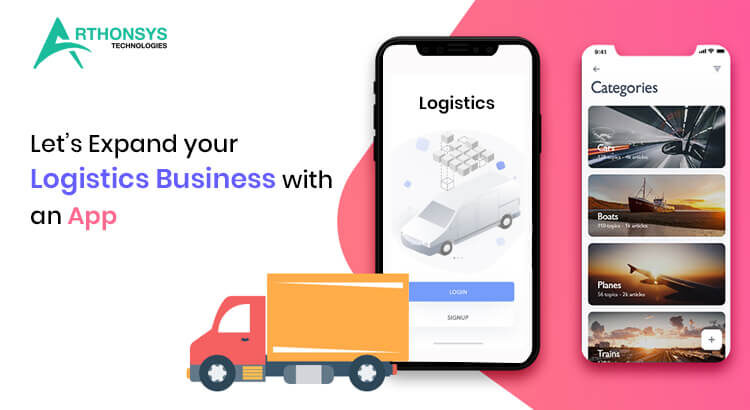Nearly 100,000 business establishments permanently shut down in 2020. But, in the major financial crisis, the global logistics market is still predicted to attain a market size of around $12,255 billion by 2022.
Why?
Because the logistics industry is the backbone of all the entrepreneurial activities—B2B, B2C, or C2C. Additionally, on-demand logistics app development intervention has broken all the barriers of cargo transportation services.
Today, you can easily turn your small truck business into a billion-dollar company by tying a knot with a logistics app development company. Really? Yes, in this post, we’ll walk you through the complete logistics mobile app development process so you can smoothly expand your business.
What is Logistics App?
The logistics app is a complete logistics solution that helps managing fleet, routes, shipments, drivers, goods, and much. It is logistics businesses’ responsibility to ship goods from one place to another. And a mobile app makes the delivery process faster and smoother with automation.
On-demand logistics app development allows logistics businesses to automate their process with the desired features. For instance, if you want a real-time location for your trucks, you can customize your app with tracking features.
Logistics apps are two-way solutions—customers can book shipments from their phones, and trucking managers can efficiently deliver them.
Why Do You Need an On-demand Logistics App Development?
“Behind every great leader there was an even greater logistician.”
– M. Cox
Whether you wish to target eCommerce companies or direct customers with your logistics business, you need speed and quality to survive in the logistics industry. You can’t run your business on traditional rules if you want to expand. With logistics mobile app development, you can grow your business in multiple ways:
Elevated Customer Services – 80% of people want the same day shipping and out of which 61% even want faster delivery than that. And the mobile app is the only fastest solution in logistics companies’ hands to provide better customer service.
Transparent Delivery – Customers want to track their deliveries so they can anticipate the delivery schedule. With a custom logistics app, you can offer full transparency to your customers and build a strong relationship with them.
Correct Deliveries – Wrong deliveries or late deliveries are one of the common logistics problems. The logistics app can tackle this problem perfectly by sending delivery notifications to the customers.
Helps with Branding – Today, if your business doesn’t have a website or mobile app, you’ll be considered outdated and unprofessional. A logistics app shows that you are a technology-oriented, progressive, and professional business.
Paperless Business – Logistics mobile app can store all your business information digitally. You don’t have to deal with inconvenient paperwork like order forms, service orders, etc.
Dispatch and Vehicle Tracking – Mobile apps with built-in warehouse management and GPS tracking features can help you coordinate dispatch and shipment orders.
Different Types of Logistics Fields — Find Out from Which One You Belong
Are you intruded to get a logistics app? After reading how much a logistics app development can benefit your business, you must be thrilled to get your app. But, before requesting an on-demand logistics app, first, define your logistics field type:

Source:- keyence.com
Procurement Logistics – It is a logistics solution for the manufacturing business where raw materials and spare parts are procured from suppliers. This logistics field wasn’t common before, but firms are actively using it with the small-lot production of different goods.
Production Logistics – Under production logistics, warehouse dispatch management, shipment management, delivery vehicles, and other delivery related logistics are handled.
Sales Logistics – Earlier, sales logistics means delivering from warehouses to retailers or wholesalers. But, now, with a direct online shopping delivery system, fast delivery is required to attract customers. Sales logistics apps manage transportation, delivery, inventory, and other customer satisfaction attributes.
Reverse Logistics – The reverse logistics work completely opposite to the sales logistics. It is a forward logistics system where returned or recycled goods are transferred from customers to warehouses. The companies that offer good return policy and support recycling use this logistics area.
Which Logistics Mobile App Development Suits You? — Types of Logistics App
Once you have defined your logistics business field, you have to pick a type of logistics app development accordingly. Generally, the following types of logistics apps are popularly used:

Fleet Management App – When you are dealing with excessive vehicles, you need to track and maintain record information of each one. With a fleet management app, you easily record, manage, and store information about your vehicles. Logistics transport software helps in maintaining a record, fuel consumption, driver’s behavior, and more.
Warehouse Management App – If you own a warehouse, the most tedious process of tracking, managing, and updating—all your deliveries can be eased by the WMS app. You can develop a barcoded app that can update your warehouse database in real-time and never let you face a shortage of stock.
POS App – Point of Sale logistics app can smooth out the sales process. The application is designed to perform cashier’s duties such as tallying the costs, adding input of your products, and conducting overall financial transactions.
Order Management App – To simplify your outbound and inbound supply chain with accounting software, you need an order management app. This app can automate your workflow with multiple channel integrations to provide comprehensive order fulfillment.
On-demand Logistics App – It is a complete delivery logistics solution that connects fleet drivers and shippers together. This is a custom app, including all other logistics apps such as carrier app, shipper app, etc.
Features of a Good Logistics Mobile App — Must Include in your App
Before developing your on-demand logistics app, one final step is knowing ‘what features must include in your logistics mobile app development.’ The prominent features that your logistics app needs to expand your business are:
Drivers Log – The app should maintain a daily driver log, including hours of work, mileage, speed limits, delivery details, etc. It is important to record drivers’ minute details so that company’s assets and reputation can be safeguarded.
Geofencing and Route Tracking – Wouldn’t you prefer tracking your drivers and fleet while sitting in the comfort of your office. The logistics app can integrate with GPS tracking technology and provide real-time information related to traffic density in a particular area, shortcut routes to reach the destination, etc.
Dedicated Admin Panel – When you are familiar with your vehicles’ exact location, you can optimize cargo better and make fast delivery possible. Once you receive a shipment order, you can track all your vehicles through an app, and the vehicle near the pick-up location; you can be sent to collect an order. On the other side, drivers will quickly receive push notifications to pick the new shipment.
Delivery Tracker – In your logistics app development, you should include a delivery tracker to record package information in real-time. The driver can update the package information constantly so that you can provide a package tracking facility to your customers. Additionally, wrong deliveries can be easily handled with automatic shipment updates.
Bill of Lading – The bill of lading logistics app stores information like contact details of shippers, third-party billing, itemized list, etc.
Cloud Storage – You required big data to run your logistics business. Therefore, to store bulky data, you required a cloud-based logistics app that makes accessing and sharing data simple. Also, cloud space can be easily expanded with your operational area.
Multilingual Support – To spread your business across borders, make your logistics app multilingual so you can effortlessly communicate with different regional drivers.
Fully Integrated – You should develop a logistics app that can be easily integrated with third-party programs. For instance, you can integrate your app with multiple payment gateways so that you can provide payment options to your customers. The leading payment gateways are credit/debit cards, e-wallets, etc.
How to Develop an On-demand Logistics App with Arthonsys
Once you have selected a suitable logistics app type, next, you have to take the following steps to complete the logistics app development process:
Step 1. Find a Mobile App Development Partner
To live your logistics app, you need the support of a logistics app development company that can understand your business objectives and help you in achieving them. You don’t need a basic mobile app development company; you need a company that deals with logistics technologies like warehouse management, order management, etc.

Arthonsys can be your complete on-demand logistics app development partner because we have vast experience in the field. We have people in our team who have been part of the logistics development and handled various logistics management projects. Thus, while selecting your logistics mobile app development partner, always consider—experience, knowledge, and technical expertise.
Step 2. Get Quotation
Next, you should get rough price estimation from your development partner. It is essential to clear the price details first—to avoid further disputes down the road. We always first ask our clients’ budget and requirements; try to complete the development process at a pocket-friendly rate.
Step 3. Planning and Designing
Once the budget is fixed, and NDA is signed, our team will sit together and create a plan to develop your logistics apps. We select the right technologies to develop your desired features. After comparing various tools and programming languages, our developers only pick the powerful logistics app development bundle.
Step 4. Develop MVP
Before creating a feature-rich app, our team will first develop a Minimum Variable Product app. The MVP app only contains the basic features that’ll give you a real idea about how your app will look once it’s fully ready. This way, if you want to modify anything in your app, it can be easily done without much trouble.
Step 5. Testing and Launch
Once QA developers have tested your logistics app on multiple levels, only then you’ll get the final product on time. After getting your approval, our developers will activate your app on the mobile app stores for your users to download.
Leading Logistics Apps
It is recommended to do deep market research before developing your on-demand logistics app. To get some idea about logistics mobile app development, you can check out the following logistics solutions:
DHL Supply Chain – DHL has coordinated with experienced developers to generate a dynamic shipping solution for their customers. The app has simplified logistics management and enabled customers to track their international shipments. It is a free tool available on iOS and Android stores.
PalletWMS – It is an agile, dependable and scalable logistics software to perform multiple operations including WMS management, order management, customer portal, etc. The app can be easily integrated with various third-party tools to provide efficient order tracking, pallet tracking and real-time inventory management.
OmniFocus – It is a micro-task management app that has an intuitive design and powerful features. The app immensely helps in improving your business productivity. When you want to streamline your cluttered logistics business, you can download this app on your Mac, iPhone, and iPad.
Veeqo – It is a complete warehouse management system for retailers. Veeqo allows multichannel retailers to efficiently manage warehouse activities from one platform. The app’s main features are—picking, packing, and shipping. You can easily manage your multiple warehouses, sales channels, and marketplaces with Veeqo.
C.H. Robinson Worldwide – When you are establishing a logistics business, this free software can manage various aspects for you. The app will keep you in control by offering a hassle-free call system, natural load planning, push notifications, and more.
How Much Does On-demand Logistics App Development Costs?
The logistics mobile app development cost depends upon various factors such as:
- Number of features
- UI/UX development
- Developers salary
- Development platform
- Special customization features, etc.
Averagely, the logistics app development cost can start from $10,000 to $40,000. This price can go even beyond that—depending upon your app requirements. Therefore, the exact cost analysis can only be provided by a logistics app development company.
Conclusion
A logistics app can be a groundbreaking solution for your business. With a reliable logistics partner, you can easily improve your warehouse, supply chain, and fleet management. For an on-demand logistics app, you can contact Arthonsys team and optimize your business processes today!




